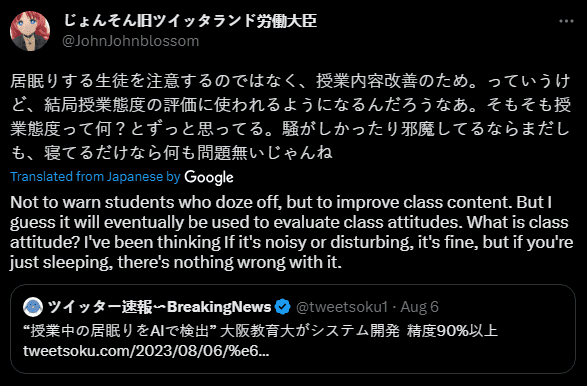A report published by NHK has sparked considerable discussion among the Japanese public about an AI system designed to detect cases of students falling asleep during class. Concerns about the system’s ethical implications and potential abuse have generated considerable attention. Conversely, there has been a strong call for the system to be implemented within the National Diet of Japan, with many expressing the view that solving the problem of delegates falling asleep at work is more important than taking short naps during their lessons.

University in Japan develops an AI system to detect students Sleeping in Classes
The AI system under experimentation was conceived by professors at Osaka Kyōiku University, a national institute specializing in teacher education. This technology employs artificial intelligence in conjunction with a thermal camera capable of simultaneously measuring the body temperature of multiple individuals and analyzing their body posture. The creators designed the system to collect data on the frequency and timing of students falling asleep or leaving their seats during class in order to improve lesson content. In practical tests, the system achieved more than 90% accuracy in distinguishing between three activities: sitting, standing, and resting one’s upper body on a desk.

Read More: Japanese Man Arrested for Stalking Idol Uta Kawase
During a press conference, project leader Professor Fumio Nakaya clarified that the system’s purpose is to facilitate data collection for training educators and improving lesson plans. He stressed that thermal cameras do not capture students’ faces, ensuring their privacy remains intact.
While the developers’ intentions are leaning toward scientific advancement, the reaction of the Japanese public has been mixed. Many people find the idea of observing students in this manner disturbing and worry that such practices could lead to a “dystopian” situation. All in all, most agree that students’ short naps should not be considered problematic and should be kept unbroken.
While some see the potential benefits of AI systems, such as alerting drowsy drivers to prevent accidents, others speculate on possible misuse, envisioning it as a tool to evaluate students and adversely affect their performance. The system’s potential to enhance lesson content also raises doubts, as student fatigue may arise from part-time work or extracurricular activities, unrelated to the quality of education provided.


As opposed to taking personal responsibility for students sleeping during self-funded lessons, the recurring issue of National Diet members falling asleep at taxpayer-funded gatherings has drawn public attention. This sentiment is evident in the widespread support for implementing new AI systems in national food rather than schools. Prominent figures like Beat Kiyoshi, followed by numerous users on platforms like X (formerly Twitter), echoed this sentiment, often mentioning the National Diet in their comments.

While the idea of monitoring Diet members’ sleep time is undoubtedly a joke, it highlights the significant problem of delegates falling asleep during their duties in Japan. A cursory search of YouTube using keywords like “National Diet sleeping” reveals a plethora of embarrassing videos depicting assembly members sleeping or fiddling with their phones, along with awkward interviews addressing these examples.
While AI systems have been overshadowed by ludicrous calls for its implementation in diets aimed at student sleepiness or desk abandonment, it remains an idea that could find its way into classrooms in the future, despite significant discomfort among many. Similarly, a recently reported AI system aimed at identifying “employees likely to quit” during the hiring process drew criticism from the Japanese public due to its potential backlash. As AI technology advances, concerns about ethics and privacy violations continue to grow.
Source: nhk, TwitterX







